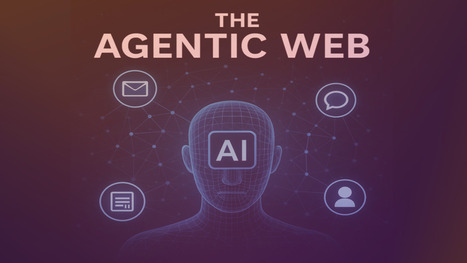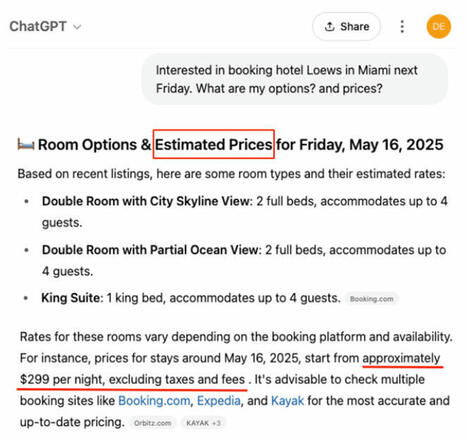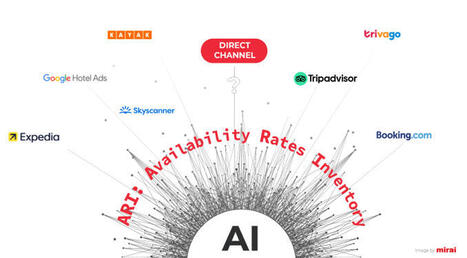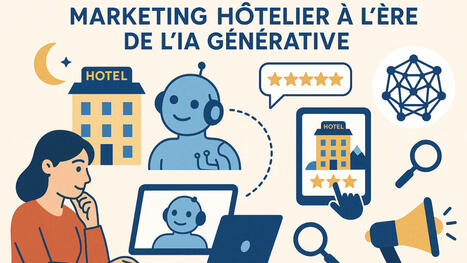 Your new post is loading...
 Your new post is loading...

|
Scooped by
Roland Schegg
May 29, 6:17 AM
|
Dario Amodei — CEO of Anthropic, one of the world's most powerful creators of artificial intelligence — has a blunt, scary warning for the U.S. government and all of us:
AI could wipe out half of all entry-level white-collar jobs — and spike unemployment to 10-20% in the next one to five years, Amodei told us in an interview from his San Francisco office.
Amodei said AI companies and government need to stop "sugar-coating" what's coming: the possible mass elimination of jobs across technology, finance, law, consulting and other white-collar professions, especially entry-level gigs.

|
Scooped by
Roland Schegg
May 29, 5:03 AM
|
Booking.com could soon face damages claims worth millions of euros as 26 national hotel associations across Europe prepare to support litigation against the company. This follows a significant ruling by the European Court of Justice, which found that Booking.com's price parity clauses - contractual restrictions that prevent hotels from offering cheaper rates elsewhere - may reduce competition, though they are not automatically illegal under EU law. The ruling has reinvigorated long-standing grievances among hoteliers about the platform’s pricing power.

|
Scooped by
Roland Schegg
May 28, 5:29 AM
|
At the Preferred Global Conference 2025 in Singapore, a standout panel on social media and travel marketing revealed a powerful shift in how influence and commerce now intersect. Far from being just a top-of-funnel inspiration channel, social media today drives full-funnel engagement — from discovery to booking — through experimentation, community, and creator-led storytelling. Panelists, including TikTok's Eason Zhang, influencers, OTAs, and platform founders, emphasized that the new travel customer journey is nonlinear, dynamic, and deeply personal.
Key takeaways
The travel funnel is dead. long live the pinball: The traditional linear funnel has been replaced by a chaotic, bouncing customer journey. Travelers pinball between TikTok, Instagram, Reddit, Google, and even ChatGPT before booking. Social media isn’t just a top-of-funnel tool anymore — it’s embedded throughout the decision-making process.
TikTok drives discovery, but threads builds community: While TikTok still drives brand visibility, creators like Amira Rahmat find Threads delivers more authentic and viral engagement. In a sea of commoditized content (like sunsets), unique narratives and representation — such as a solo hijabi traveler - offer deeper resonance.

|
Scooped by
Roland Schegg
May 26, 11:25 PM
|
In January, I wrote about three trends that will define 2025 as a breakthrough year for Hybrid Intelligence: Agentic AI Multimodal AI And the fusion of physical-world data with Generative AI Together, I argued, these forces will scale our ability to create and apply knowledge, transforming how we so

|
Scooped by
Roland Schegg
May 25, 7:20 AM
|
No artificial intelligence (AI)-powered hospitality distribution models offer live pricing for hotels. So far, these platforms only display estimated prices. This is a huge weakness when it comes to driving actual bookings and explains why AI hasn’t been a game changer yet.

|
Scooped by
Roland Schegg
May 22, 3:15 AM
|
Switzerland’s price watchdog has taken decisive action against Booking.com, ruling that the platform's hotel commission fees are excessive under national pricing laws. The regulator has ordered the company to reduce these rates by nearly 25%, a decision Booking.com plans to appeal. This move is part of a broader European shift toward increasing fairness and transparency in online travel agency (OTA) practices, especially regarding pricing structures and hotel contract terms.
Key takeaways
Commission cut mandated: Switzerland’s price watchdog has ordered Booking.com to reduce hotel commission rates by nearly 25% due to excessive pricing.
Temporary measure: The ruling will apply for three years once enacted, but Booking.com has three months to comply.
Pending appeal: Booking.com disagrees with the decision and will appeal to the Federal Administrative Court. Commission rates will remain unchanged during the appeal process.
Past regulatory pushback: Swiss law already prohibits OTAs from enforcing price parity clauses, allowing hotels to offer lower rates on their own websites.
European context: The move follows a growing European trend of regulating OTA practices, as supported by a European Court of Justice ruling favoring price flexibility for hotels.

|
Scooped by
Roland Schegg
May 21, 2:56 AM
|
C'est une mesure drastique qu'a prise le Surveillant des prix contre la société Booking.com. Dans un communiqué publié ce mercredi, il annonce que celle-ci devra baisser ses tarifs, car les taux de commission appliqués par l’entreprise sur les hôtels suisses (environ 15% par nuitée) sont «abusivement élevés».

|
Scooped by
Roland Schegg
May 20, 10:03 AM
|
Dans un paysage digital de plus en plus concurrentiel, le marketing automation est devenu un levier clé pour aider les entreprises à se développer. En automatisant les interactions avec les clients, il permet de mieux capter leur attention, de renforcer l’engagement et d’offrir une expérience personnalisée, rapide et pertinente.
C’est dans ce contexte que User.com, une plateforme de marketing automation en no code, propose un livre blanc sur le sujet qui répond à ce défi en permettant aux entreprises de réagir rapidement aux besoins de leurs clients.

|
Scooped by
Roland Schegg
May 13, 11:54 PM
|
AI is transforming how we shop and pay. Visa is bringing the power of its network and decades-long expertise to bring trust and security to AI-driven commerce. Introduced today at the Visa Global Product Drop, Visa Intelligent Commerce enables AI to find and buy. It is a groundbreaking new initiative that opens Visa’s payment network to the developers and engineers building the foundational AI agents transforming commerce.
“Soon people will have AI agents browse, select, purchase and manage on their behalf,” said Visa’s Chief Product and Strategy Officer Jack Forestell. “These agents will need to be trusted with payments, not only by users, but by banks and sellers as well.”

|
Scooped by
Roland Schegg
May 12, 9:47 AM
|
In der Schweiz gibt es kein Gesetz, welches den Umgang mit künstlicher Intelligenz (KI) explizit regelt. Der Bundesrat entschied zwar, die KI-Konventionen des Europarats ins Schweizer Gesetz zu übernehmen. Erste Umsetzungsvorschläge will er aber erst Ende 2026 in die Vernehmlassung schicken.
Natürlich heisst das nicht, dass KI-Tüftler nach Belieben Anwendungen entwickeln und veröffentlichen dürfen. Grenzen setzen ihnen die bestehenden, nicht KI-spezifischen Gesetze. Welche Grenzen im Bereich des Datenschutzes bestehen, erläutert der eidgenössische Datenschutz- und Öffentlichkeitsbeauftragte (EDÖB) in einem jüngst veröffentlichten Update. Darin weist er darauf hin, dass das Schweizer Datenschutzgesetz (DSG), welches seit September 2023 in einer revidierten Fassung gilt, technologieneutral formuliert wurde. Darin enthaltene Vorschriften seien auch bei KI-gestützten Datenbearbeitungen einzuhalten – unabhängig von den zukünftigen Regulierungen.

|
Scooped by
Roland Schegg
May 9, 12:37 AM
|
In a fitting nod to their reputation as “Silicon Beach,” there’s a new tech-forward tool available for travelers heading to Santa Monica. Visitors can now receive travel planning assistance with Santa Monica Guide, an AI travel genius. Santa Monica Travel & Tourism recently launched the new feature on santamonica.com using GuideGeek artificial intelligence technology from Matador Network.
Santa Monica Guide is designed to supplement the destination’s three in-person Visitor Information Centers, dedicated travel specialists and the greater team. The AI tool can instantly plan an entire itinerary or answer specific questions about the best wellness experiences, beach activities, restaurants, neighborhood hot spots, hotels and more. The personalized, real-time responses are generated by AI trained on extensive data from Santa Monica Travel & Tourism and enhanced by over 1,000 integrations for travel information from GuideGeek’s award-winning technology.

|
Scooped by
Roland Schegg
May 9, 12:35 AM
|
The new neighborhood features include proprietary and intuitive AI-powered tools to help travelers easily identify their ideal destinations by matching their preferences to neighborhoods with similar atmospheres and attractions.

|
Scooped by
Roland Schegg
May 8, 5:12 AM
|
In our recent article, “Cost-Effective AI Solutions for a Complex Market,“ we explored how AI is helping hospitality professionals navigate challenges like staffing shortages and rising operational costs. However, one critical area where many AI solutions fall short is emotional intelligence.
Despite the numerous advancements in artificial intelligence, the emotional intelligence gap remains one of AI’s most significant hurdles. According to a PwC study, 73% of consumers say that customer experience is a critical factor in their purchasing decisions, with emotional connection being a key driver of guest loyalty. But how can hotels achieve emotional connection when their primary tool for communication lacks empathy?
|

|
Scooped by
Roland Schegg
May 29, 5:18 AM
|
No AI (Artificial Intelligence) powered hospitality distribution models offer live pricing for hotels. So far, these platforms only display estimated prices. Needless to say this is a huge weakness when it comes to driving actual bookings and explains why AI hasn’t been a big gamechanger yet.

|
Scooped by
Roland Schegg
May 28, 5:31 AM
|
Behind the polished facade of Booking.com’s global success lies a story of internal power struggles, cultural clashes, and controversial practices. In The Machine, three Dutch journalists peel back the curtain on the Amsterdam headquarters and reveal the human dramas that shaped the company - from executive firings and clandestine affairs to burnout-fueled booze-fests and covert data breaches. Drawing on extensive reporting and Booker Holdings’ own fact-checking, the book chronicles Booking.com’s rise from a scrappy Netherlands startup to the world’s leading hotel-booking platform, while exposing the tensions and tactics that drove its meteoric growth.

|
Scooped by
Roland Schegg
May 28, 5:28 AM
|
At the Preferred Hotels Global Conference in Singapore, a lively panel discussion unpacked how Gen Z, social media creators, and platforms like TikTok are transforming the traditional travel funnel into a seamless journey from inspiration to purchase. Today, travel isn’t searched - it’s scrolled. With virtual influencers, AI-generated content, and shoppable videos, social platforms are collapsing the gap between dreaming and booking, making travel planning a real-time, video-first experience.
Key takeaways
Social media is the new travel funnel
Gen Z and creators are transforming travel inspiration into instant commerce.
TikTok, with hashtags like #TravelTok (30B+ views), blurs the lines between discovery and decision-making.
Users spend 90 minutes per day on TikTok, increasingly using it as a full-funnel platform.
Influencers: From storytellers to sellers
Creators like Saudi influencer Ali Almeshaal now run their own travel agencies to meet follower demand.
Virtual influencers like Singapore’s Rae are gaining traction with 20–30% higher engagement and easier management.

|
Scooped by
Roland Schegg
May 25, 7:22 AM
|

|
Scooped by
Roland Schegg
May 25, 7:16 AM
|
J’ai récemment testé plusieurs assistants de voyage propulsés par l’IA, et je dois avouer que l’expérience s’avère bluffante. Fini le temps où je passais des heures à planifier chaque détail ! Ces nouveaux compagnons numériques analysent mes préférences passées, mes contraintes budgétaires et même mes humeurs pour proposer des itinéraires sur mesure. Lors de mon dernier périple dans les Alpes, une application a même ajusté mon parcours en fonction de la météo prévue, me sauvant d’une randonnée sous l’orage.
Les assistants de voyage intelligents ne se contentent plus de nous suggérer des destinations, ils anticipent nos besoins. Comme je l’évoquais dans mon édito de la semaine 10, ces outils deviennent de véritables compagnons de route. Ils nous alertent des changements d’horaires, proposent des alternatives quand un site est bondé, et nous suggèrent des trésors cachés correspondant parfaitement à nos goûts.
La personnalisation poussée à l’extrême devient la norme. J’ai découvert que l’IA peut désormais créer des circuits touristiques adaptés à votre rythme circadien ! Imaginez un planning qui prévoit les activités énergiques quand vous êtes au sommet de votre forme, et des moments plus calmes lors de vos baisses d’énergie naturelles. Cette synchronisation avec notre horloge biologique pourrait bien moderniser la façon dont nous vivons nos voyages.

|
Scooped by
Roland Schegg
May 22, 2:46 AM
|
Google's smart glasses will be a direct competitor to the Ray-Ban Meta glasses, both attempts at building hardware especially for the latest AI.
Google is giving travelers another option for a wearable live translator and personal travel guide. The company revealed more information about its upcoming smart glasses at the I/O developer conference on Tuesday, among a slew of other announcements.
Gentle Monster and Warby Parker will be the first eyewear brands to deploy the tech, which the latter said would be released “after 2025.”
They’ll be a direct competitor to the Ray-Ban Meta smart glasses, which recently got a feature for live voice translation along with the ability to act as a tour guide. The company tried smart glasses once before with Google Glass but stopped making them in 2015.

|
Scooped by
Roland Schegg
May 21, 1:57 AM
|
This was Google's biggest group of AI announcements yet. With all the of the travel-related demos, the industry is clearly top-of-mind during development.
Google announced several AI enhancements during its annual I/O developer conference Tuesday, with travel-related demos for many of them.
It’s the biggest travel-related AI update since last year’s conference, where Google announced a trip planner for the Gemini chatbot, which the company later told Skift it was no longer pursuing.
The latest Search upgrades were among a slew of product announcements on Tuesday that included:
Smart glasses, with plans for live voice translation and a connection to Maps for real-time navigation. AI-generated replies in Gmail to create and share an itinerary, which take into account information from emails and other apps. Near real-time voice translation in Google Meet, which the company said could be useful when making travel bookings in other countries. A new Gemini chatbot extension for Chrome that allows users to reference a webpage during prompts, such as asking the AI to compare multiple hotel reviews.

|
Scooped by
Roland Schegg
May 20, 1:41 AM
|
Airbnb has a strong brand and millions of loyal users – but its mission to build a $1 billion experiences business in the next few years will face multiple challenges.
"Whether the unit economics are good enough, whether there's enough supply, whether it's big enough to be more than a rounding error on [Airbnb's] total GBV [Gross Booking Value]: these are all outstanding questions," wrote Thomas Reiner, a partner at Altimeter Capital, in a recent research note.
Among the challenges: 1. Low Growth Rates Reiner noted that the tours and activities sector "just isn't growing that quickly." Using a variety of industry sources, Reiner estimated that the total addressable market for the global tours and experiences sector would grow at a compound annual growth rate of just a 7% rate from 2024 to 2030, to $400 billion.

|
Scooped by
Roland Schegg
May 12, 9:51 AM
|
Les plateformes d'IA générative remplaceront-elles les humains en milieu hôtelier? Non. Mais on aurait tort de s'abstenir des avantages qu'elles procurent!

|
Scooped by
Roland Schegg
May 12, 8:33 AM
|
Die generative KI gilt längst als vielseitiger Helfer bei technischen Problemen oder lästigen Schreibarbeiten. Doch dafür werden Chatbots immer seltener verwendet. Stattdessen dienen ChatGPT und Co. vielen Menschen als emotionale Unterstützung bei persönlichen Herausforderungen.

|
Scooped by
Roland Schegg
May 9, 12:36 AM
|
Airbnb started rolling out an AI-powered customer service bot in the U.S. last month, CEO Brian Chesky said during the firm’s first-quarter conference call on Thursday.
Chesky said 50% of Airbnb’s U.S. users are already using the AI bot for customer service, adding that the company plans to roll out the feature to all its users in the country this month.
“One thing I’ll say about AI [is that] it is definitely making the customer experience easier … It has already led to a 15% reduction in people needing to contact live human agents,” he noted during the analyst call.

|
Scooped by
Roland Schegg
May 9, 12:34 AM
|
Three of the world’s largest payment companies, Visa, Mastercard and PayPal, are racing into the next frontier in digital commerce: agentic AI.
All three announced recently they were deploying agentic commerce, a fast-emerging trend in which AI agents not only assist consumers with shopping but also complete transactions on their behalf.
|

 Your new post is loading...
Your new post is loading...
 Your new post is loading...
Your new post is loading...

























